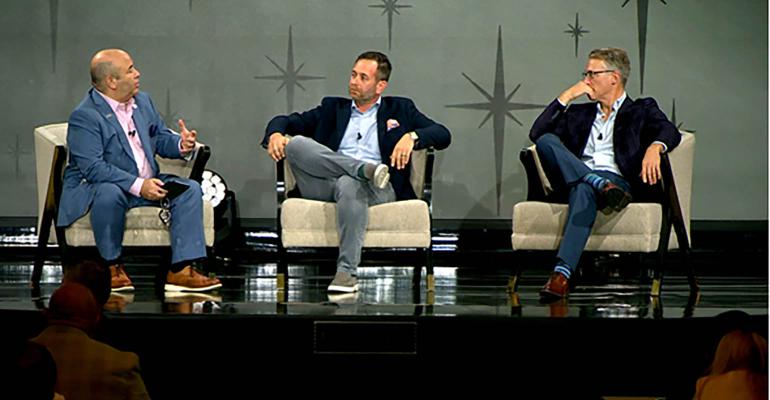Three industry veterans took to the stage Tuesday at Nitrogen's Fearless Investing Summit in Miami, Fla. to discuss several emerging trends in wealth management.
Brian Hamburger, MarketCounsel CEO; Doug Fritz, F2 Strategy CEO; and Steve Leivent, senior vice president and co-general manager of SS&C Advent, tackled topics including innovation, mergers and acquisitions, artificial intelligence and more.
Hamburger said much of the innovation in the industry continues to center around technology, which can create unique challenges.
“As innovation accelerates, advisors are starting to become more meaningful and deliberate as to where they build,” he said. “Once the primary driver of M&A, scale remains the motivation for most buyers. However, many of the sellers we speak to are concerned about the increasing complexity of the business.”
Fritz said even five years ago, most analysts would not have predicted this much volume and this amount of continued momentum in M&A.
Leivent said one of the benefits of this trend is firms’ increased ability to specialize as they grow.
As the race to acquire talent to keep up with this growth accelerates, Hamburger said he was “starting to see cracks in the foundation where this collegiality that we’ve enjoyed in the independent wealth space is starting to crumble.”
“All of a sudden … collegiality is being replaced by competition,” he said.
Turning to technology, Fritz said he has seen larger, growing firms using the same stack they used when they were much smaller.
“They’re trying to run a big architecture on cobbled-together little tech. If the SEC comes in and asks for something … good luck with that,” said Fritz. “People that are working at that firm are so used to using their technology, whenever they get around to changing it and making it more sustainable, it’s going to be a cultural backlash. And then you’re stuck with it.”
Leivent said this scenario becomes more difficult and expensive to unwind the bigger the firm becomes.
“You probably should not defer that decision to move to a modern tech stack if you have aspirations to grow and build your business,” he said. “Your team members are going to struggle to grow a business and adopt new technology at the same time.”
Hamburger said “technology largely defines a firm” and both recruits and clients want to know what firms are running and how data is being handled and protected.
“People are asking harder questions,” he said.
Fritz said building data integration into a firm’s system is the new definition of having a “nimble” tech stack.
“When you have your own data, it’s getting easier to send that data back and forth between technologies,” he said.
On AI, the panel agreed that the technology would not replace advisors, but would make practices more efficient.
“How many hype cycles since 2000?” said Fritz. “We have this tendency if the market doesn’t create an emergency for us, we have to create an emergency for ourselves.”
Fritz said the main benefit of AI that he saw was that it would cause firms to realize the utility of owning their data.
“I need to start to consume and package my data to enable the AI widget or the chatbot or the automated ‘Next Best Action’ client conversation tool,” he said. “Because I organized my data all of a sudden my life got a ton easier, my performance was better, I fixed all my billing problems and I’m able to provide household-level balance to my clients. All of this stuff that we should have been doing anyway for a long time, we’re going to get because people are going to be paying attention to AI.”





